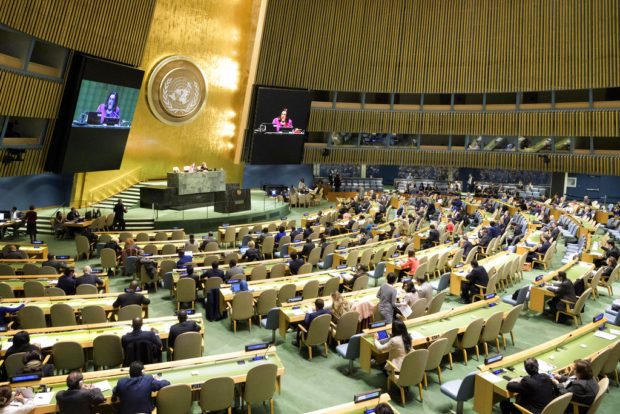UN votes overwhelmingly to condemn US embargo of Cuba
UNITED NATIONS — The UN General Assembly voted overwhelmingly Thursday to approve a resolution condemning the American economic embargo of Cuba after rejecting proposed US amendments strongly criticizing the lack of human rights in the country.
The vote on the Cuban-sponsored resolution in the 193-member world body was 189-2 with no abstentions. The US and Israel voted “no” and Moldova and Ukraine did not vote.
In separate votes on the proposed US amendments, Ukraine and Israel were the only countries to join the US in voting “yes” on all eight measures while the Marshall Islands backed one amendment. Some 114 countries voted against the amendments and about 65 abstained.
General Assembly resolutions are unenforceable but they reflect world opinion and the vote has given Cuba an annual stage for the last 27 years to demonstrate the isolation of the US on the embargo. It was imposed in 1960 following the revolution led by Fidel Castro and the nationalization of properties belonging to US citizens and corporations, and two years later it was strengthened.
Cuba’s Foreign Minister Bruno Rodriguez Parrilla called the US embargo “a flagrant, massive and systematic violation of the human rights of Cuban men and women” and denounced what he called the politicized US amendments.
US Ambassador Nikki Haley called the vote “a waste of time” and said before the votes that “our reason for the embargo is and has always been Cuba’s denial of freedom and the denial of the most basic human rights for the Cuban people.”
After the votes, Haley told the assembly: “there are no winners here today, there are only losers.”
Shd said the UN “lost the opportunity to speak on behalf of human rights” but most of all the Cuban people have “been left, once again, to the brutal winds of the Castro dictatorship.”
“They have been abandoned by the United Nations and most of the world’s governments, but the Cuban people are not alone today,” Haley said. “The American people will stand with them until they are restored the rights that God has given us all, rights that no government can legitimately deny its people.”
The Trump administration’s decision to call for individual votes on the amendments represented an escalation of its action last year and reflected worsening US-Cuban relations. In 2017, the US returned to voting against the resolution after the abstention by the Obama administration in 2016 for the first time in 25 years.
Diplomatic ties between the United States and Cuba were broken in 1961 as relations between Washington and Fidel Castro’s government deteriorated. Cuban President Raul Castro and then President Barack Obama officially restored relations in July 2016. But relations have deteriorated under President Donald Trump, and ambassador Haley and others have sharply criticized Cuba’s human rights record.
On Wednesday, diplomats representing over 135 countries supported the Cuban resolution on the “necessity of ending the economic, commercial and financial embargo imposed by the United States of America against Cuba.”
Egyptian Ambassador Mohamed Edrees, speaking on behalf of the Group of 77 which represents 135 developing countries and China, pointed to “the positive steps … focused in the right direction” taken by the Obama administration and expressed regret at the Trump administration’s new policy “aimed at strengthening the embargo against Cuba.”
He said the G77 “believes this is a setback in the process of achieving normalized relations between both countries.”
The G77 reiterates its call for the embargo to be lifted and appeals to the international community “to further step up efforts” in support of lifting the embargo, Edrees said.
Ambassador Sheila Carey of the Bahamas reiterated the Caribbean Community’s “unequivocal opposition” to the embargo, saying last year’s near unanimous vote in favor of immediately lifting it “is a clear indication of prevalent disapproval by the UN membership.”
In 2017, the General Assembly adopted the Cuban-sponsored resolution by a vote of 191-2, with Israel joining the US in voting “no.” That was the same vote as in 2015. In 2016, the US abstained.
Carey noted that Cuba is the most populous country in the Caribbean and “we are a sisterhood and brotherhood of nations that continues to enjoy mutually beneficial relations.”
She said CARICOM, which maintains friendly relations with the US and Cuba, is concerned at “the proposed rollback” of progress toward normalizing US-Cuban relations.
“As an important player in international affairs we hope that the United States will be open to considering the opinions and concerns of its friends and traditional partners on this issue,” Carey said.
South African Ambassador Jerry Matjila said: “The imposition of this unilateral coercive measure by a major economy, such as the United States, against our fellow developing country, one of its closest geographical neighbors, has caused immeasurable damage to the development of the people of Cuba and remains as ever before, unjustified.”
He expressed regret that the gradual relaxation of the embargo under Obama has been reversed “and the people of Cuba are once again faced with a monumental obstacle toward the fulfillment of their basic human rights, including the right to development.” /ee
